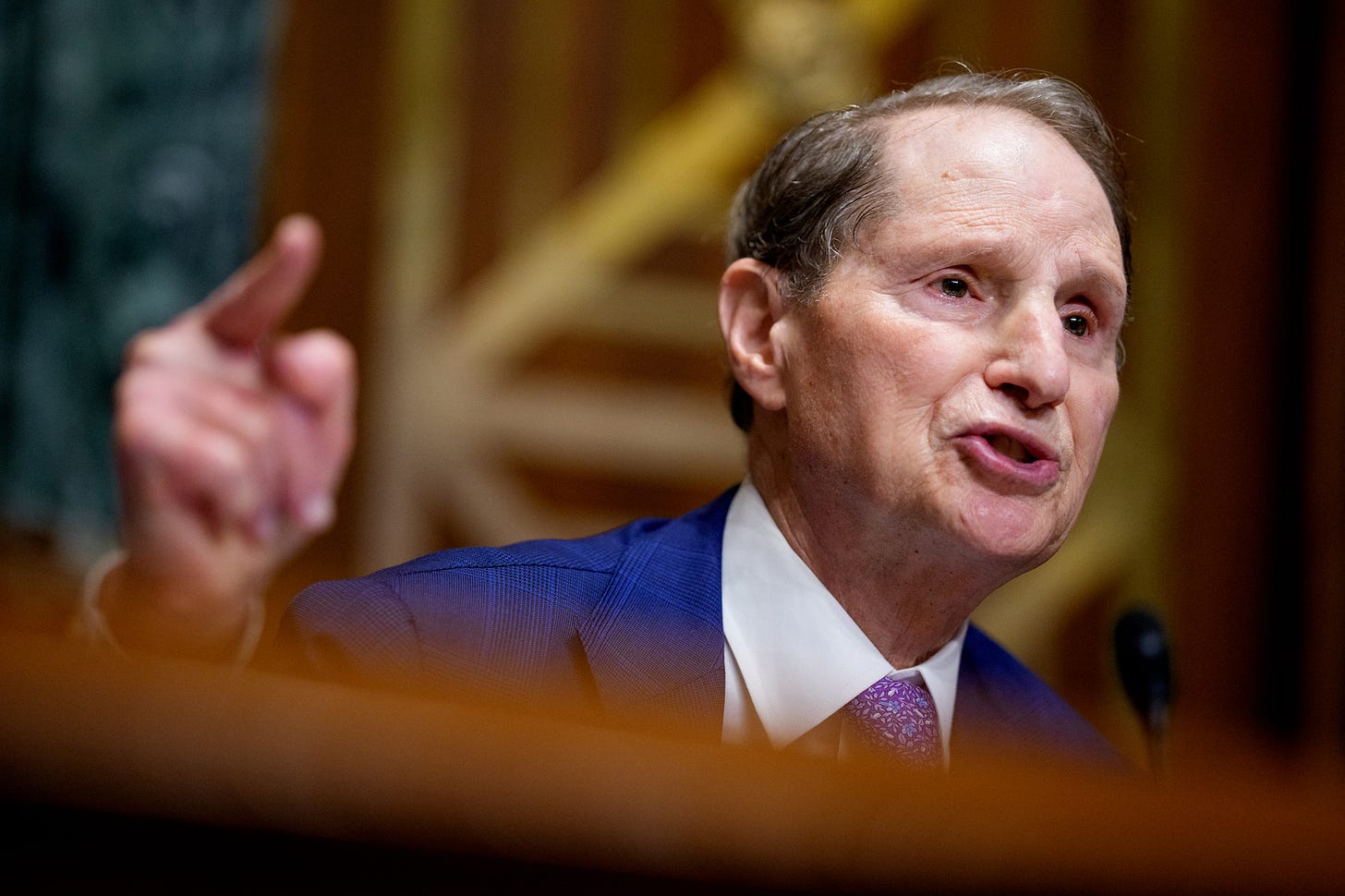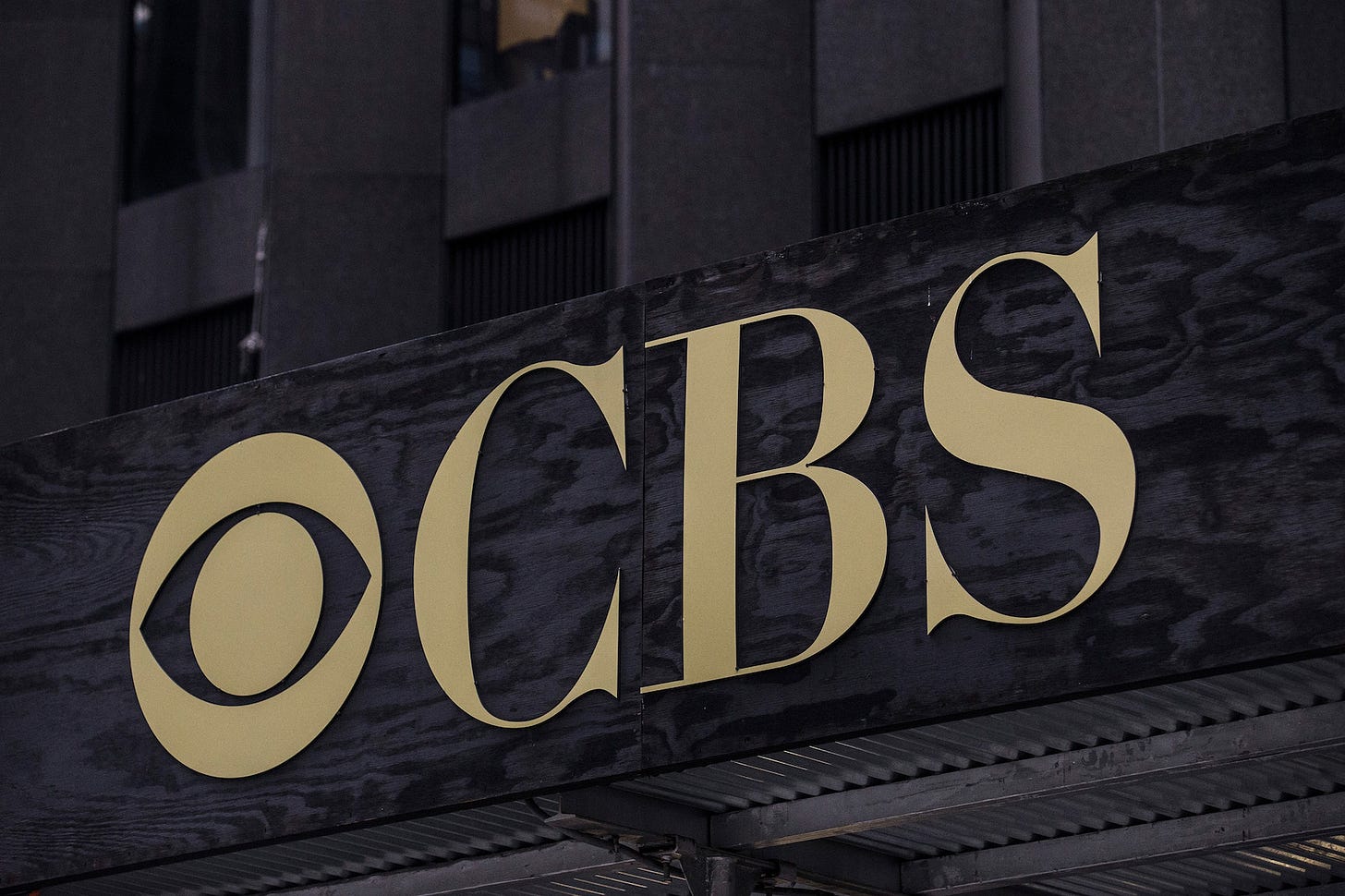Paramount capitulates to Trump: Our guide to the bribery probes
All Rise News breaks down the shareholders and lawmakers pursuing investigations into the $16 million deal ending Trump's suit against CBS.
All Rise News has no board or investors to compromise our coverage. We report detailed, insightful, and thorough news you can trust — without compromises.
Our paid subscribers make that possible and unlock deeper analysis.
Shareholders and Democratic senators are not taking Paramount Global’s $16 million settlement with Donald Trump lightly.
Days before Paramount threw in the towel on Trump’s federal lawsuit against “60 Minutes,” the Freedom of the Press Foundation sent a letter to the media conglomerate demanding to inspect their books and records for the “purpose of investigating potential wrongdoing.”
“A permanent monument to Paramount’s surrender”
Paramount recognized that Trump’s lawsuit accusing CBS News of deceptively editing its “60 Minutes” interview with Kamala Harris was “baseless,” but the letter noted that CEO Shari Redstone would likely capitulate anyway to facilitate the company’s $8 billion merger with Skydance Media, which requires FCC approval.
“This concern is not based on mere conjecture,” the 4-page letter said, noting that FCC chairman Brendan Carr himself tied Trump’s lawsuit to his agency’s approval of the merger.
“I’m pretty confident that that news distortion complaint over the ‘60 Minutes’ transcript is something that is likely to arise in the context of the FCC review of that transaction,” Carr said in November.
Paramount’s settlement does not include an apology or admission of wrongdoing, and the money directly funds Trump’s presidential library. The Knight First Amendment Institute’s Jameel Jaffer pointed out that fact in lamenting Paramount’s buckling to Trump’s “extortionate” $20 billion lawsuit.
“Now Trump’s presidential library will be a permanent monument to Paramount’s surrender, a continual reminder of its failure to defend freedoms that are essential to our democracy,” Jaffer said.
Shareholders, along with state and U.S. senators, have denounced that contribution to Trump’s library as a bribe designed to obtain official approval of the Paramount-Skydance merger.
Here is a breakdown of their investigations.
“A bribe for merger approval”

Sen. Ron Wyden (D-Ore.) pulled no punches after the Paramount settlement became public.
“Paramount just paid Trump a bribe for merger approval,” Wyden wrote on Bluesky. “When Democrats retake power, I’ll be first in line calling for federal charges. In the meantime, state prosecutors should make the corporate execs who sold out our democracy answer in court, today.”
Wyden’s strong opposition to the deal wasn’t unexpected.
In late May, Senators Elizabeth Warren (D-Mass.), Bernie Sanders (I-Vt.), and Wyden jointly opened an investigation into whether any concessions by Paramount would amount to a “quid pro quo.”
In addition to bribery, the senators worried about Paramount’s censorship of their subsidiary.
“Paramount’s scheme to curry favor with the Trump Administration has compromised journalistic independence and raises serious concerns of corruption and improper conduct,” they wrote in a 4-page letter to Redstone.
The senators asked Redstone about Paramount’s policies and procedures related to compliance with federal anti-bribery laws, along with eight other questions in their query.
“Specifically, have Paramount officials discussed settling the lawsuit or making other concessions with President Trump or Trump Administration officials in the context of the merger approval?” one of those questions asked.
Paramount and Redstone did not respond to the letter by the senators’ deadline of June 2, according to Wyden’s office.
“Protecting the integrity of California’s communications economy”
As Wyden pointed out, pressure on Paramount isn’t only coming from federal officials.
On May 30, the leaders of two California Senate committees — the Energy, Utilities & Communications Committee and the Judiciary Committee — extended invitations to ex-”60 Minutes” executive producer Bill Owens and former CBS president Wendy McMahon, who both resigned over disagreements over the network’s direction.
“Your recent resignations from CBS’s leadership, amid public reports of internal concern about the editorial and ethical implications of the proposed settlement, suggest that you may possess important, first-hand knowledge relevant to our legislative oversight responsibilities,” the committees’ leaders wrote.
State Senator Josh Becker (D), one of the authors of the letter, did not immediately respond to an email asking whether Owens or McMahon ever responded. Their invitations to testify were voluntary and had no deadline.
Golden State senators expressed concerns that a settlement would undermine fair competition across the media sector, penalize ethical competitors, distort the media marketplace, and negatively affect news consumers.
“This inquiry is therefore not only about one company or one lawsuit, but about protecting the integrity of California’s communications economy, ensuring that public-facing media enterprises compete based on content and quality, not influence, capitulation, or political appeasement,” their letter states.
The state senators said that they were investigating Paramount’s compliance with federal anti-bribery laws and California’s Unfair Competition Law, while also looking into the board’s fiduciary duties to shareholders and use of corporate funds.
Describing the invitation as voluntary, the state senators did not give Owens and McMahon a deadline to respond, and neither has responded publicly for more than a month.
The senators forwarded a copy of their May letter to California Attorney General Rob Bonta (D), whose office did not respond to an email requesting comment by press time.
“A gross breach of the Board’s fiduciary duties”
Paramount Global has been on notice since early June that they would face a shareholder derivative lawsuit if the company settled with Trump, a point that powerhouse lawyers Abbe Lowell and Norm Eisen made as clear as possible.
“A settlement with President Trump here would constitute a gross breach of the Board’s fiduciary duties to its shareholders, and we believe could violate laws prohibiting bribery of public officials, thereby causing severe and lasting damage to Paramount and its shareholders,” the duo wrote in a letter on June 27.
Lowell is Hunter Biden’s former criminal defense attorney, and Eisen is an ex-U.S. Ambassador, ethics czar, and attorney who helped lead the investigation before Trump’s first impeachment.
“To be as clear as possible, you control what happens next,” the attorneys warned Redstone. “If the public reporting is correct about the Board’s intentions, we hereby notify you of our client’s unequivocal intent to initiate a shareholder derivative lawsuit against the Board of Directors in the event such a settlement is consummated.”
Their letter argues that settling a “frivolous” lawsuit would constitute corporate waste, breach the board’s duty of oversight to prevent bribery, and constitute self-dealing.
Media lawyer and former federal prosecutor Mitchell Epner said that the size of the settlement, and the market’s response to the deal, could make such a lawsuit challenging.
“A derivative case would be very difficult, because the decision to pay off Trump likely was economically beneficial to the company,” Epner said.
But the shareholders’ lawyers note that broader reputational damage to the companies are also at stake.
“Paramount’s capitulation in this case would signal that politically motivated lawsuits—against any institution—can succeed when paired with regulatory threats,” their letter states. “Make no mistake, a settlement also would damage public trust in CBS News and diminish its reputation as a national leader in ethical, impartial journalism.”
Paramount and CBS News did not respond to emails requesting comment.





